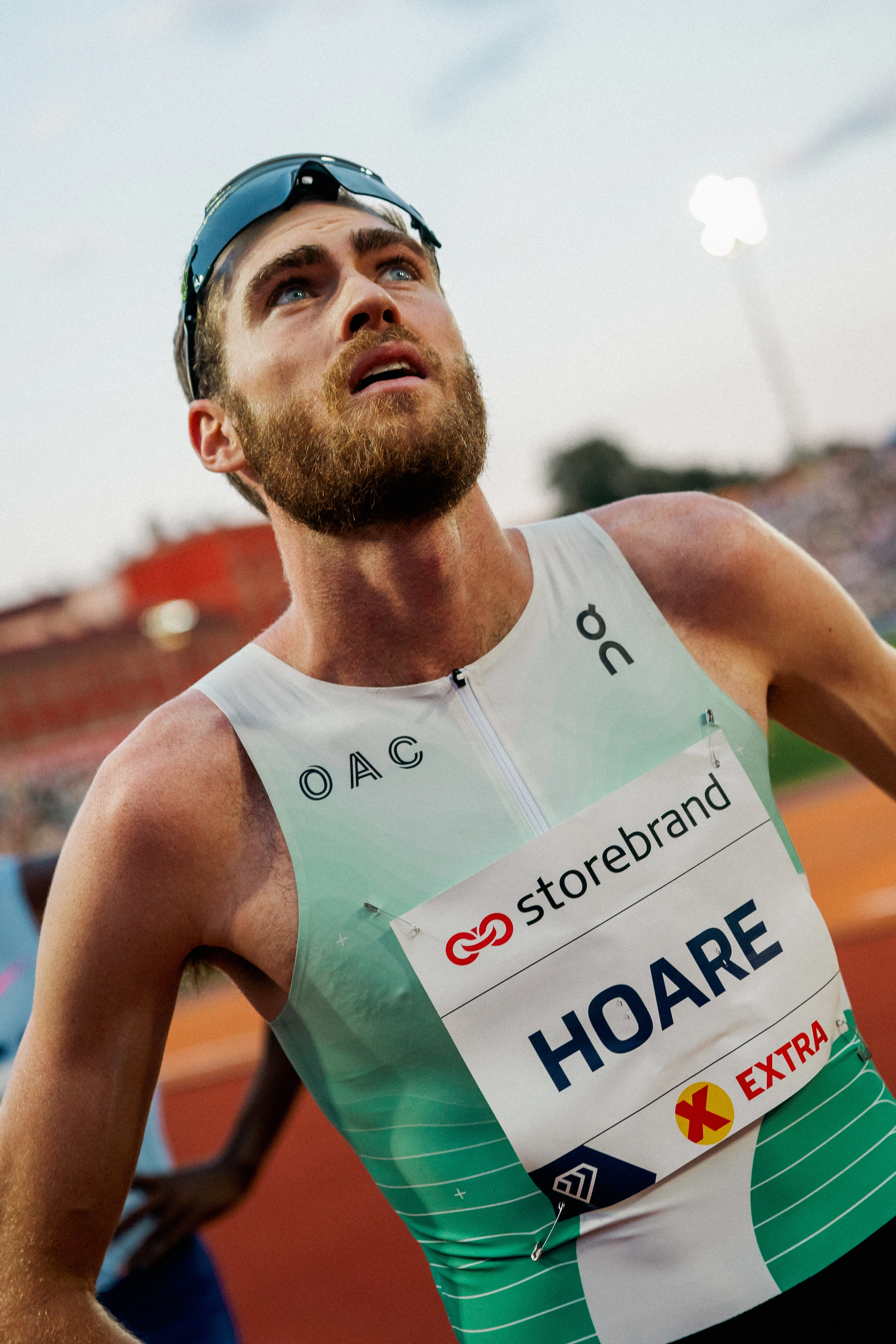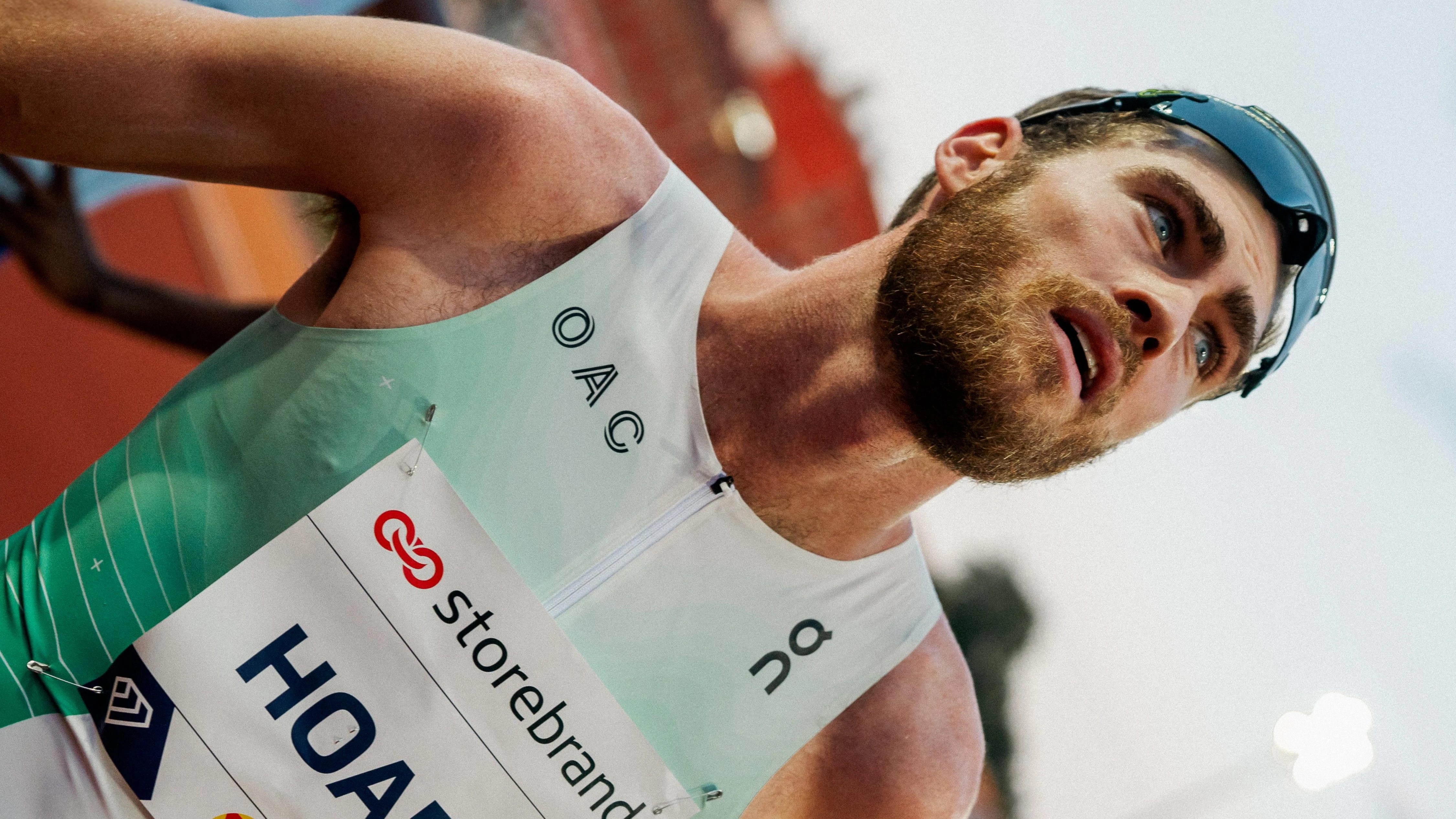

Australian runner Oliver Hoare has spent his life finding freedom in the outdoors. Now an Olympian, he reflects on how the beaches of his youth shaped the athlete he is today.
Words by Cole Pressler. Photography by Colin Wong and from Hoare family archive
When On Athletics Club athlete Olli Hoare returns home to the Australian coast, he heads straight for the beach.
He runs on the sand, smells the salt from the ocean air, listens to the waves crash, and feels the baking sun on his face. “I could swim and surf before I could walk,” he says.
As the 1500-meter specialist's spikes pounded the tough track at the Millrose Games in New York City in February 2023, he remembered when the ground didn’t feel so rigid. When the endless oval track was still foreign to him.
Hoare’s 2023 track season was cut short due to a sports hernia just weeks before the World Athletics Championships. He returned to his family in Cronulla, a breathtaking stretch of coastline just south of Sydney, where he first fell in love with the Pacific Ocean and its beaches.
That love for nature extended beyond the beach and into the wilderness. When he was eight, his dad took him on his first trail run through the Australian bush. As he made his way through the rippling terrain, keeping an eye on his feet to make sure he didn’t trip, he would look around at the crimson waratah flowers and inhale the sweet aroma of golden wattle.
“In the desert sandy areas, I’d smell the earth,” Olli says. “It’s a unique smell, very summery. Even in the winter — the wet season — you can kind of sense if it’s going to rain, which was fun on the trails.”
Those runs were a highlight of his childhood, even though he could only go a few kilometers without losing his breath.
He tried track running when he was eight or nine, but it felt unnatural to him. To Olli, it just felt like a pointless 400-meter loop. Before he fully realized his full potential on the track — and the art and strategy of the sport — he capitalized on his strength as a swimmer.
He stayed by the shore into his teenage years, competing for his local surf club in Surf Life Saving competitions, uniquely Australian events with individual and team swimming and surfboarding challenges — not dissimilar in format to a track meet.
Olli excelled in the water, but the event that captivated him most was the two-kilometer beach run: an out-and-back straightaway sprint barefoot across the scorching sand.
“It made me fall in love with running in a different way,” he reflects. “I was very competitive and nervous about my swimming and board riding because that was more popular, but when the 2km started to pick up, that’s where I had fun.”
Running on sand is much less rhythmic than on other surfaces. “I compare it to running uphill, but you’re always sticking to the ground.” The event burns your legs quickly, requiring precise timing and tactical foot placement — stepping in existing footprints, where the sand was already packed down.
There’s also a choice to make — run closer to the ocean where the surface gets harder but with a longer path to take, or run the shorter line where the sand is soft and deep.
“When you’re running in soft sand, your legs get extremely sore,” Olli says. “You need to be tactical, so you’re not spending too much time on the soft sand, but also strategizing your route, so you don’t blow your doors off in the last 100m.”
The young Aussie tried to break his competitors’ spirits early, squeezing them out and rolling into the finish with as much momentum as possible. He’d win races by more than 50 meters.
By age 15 and 16 Hoare had two national titles in the beach run, following the footprints of his dad, who had won two world titles in the event years prior, and his grandfather, who competed in the beach run in the 1950s.
Through the years, his former coach and teammates in Cronulla have pleaded with him to come back and run the open beach run championship, to win another national title for their club. The event has ballooned in popularity since he was in high school, Hoare says — there are more distances now, like the 1km run and several relays. The Olympian can only speculate how much his achievements have contributed to that when I ask.
Being in nature — on the beach, on the trails, in the water — gave Hoare a sense of freedom he had first discovered as a child exploring those trails in Cronulla with his dad.
But while beach competitions and swimming helped him connect with the environment around him, track could take him around the world. To places he had never dreamed of going. To the Olympics.
When he was 17, he decided to quit water sports and go all-in on running. That meant leaving the sand behind — and stepping back onto the track.
“Running around one lap felt so long,” he says. “For some reason, the two-kilometer beach run would feel shorter. It just made more sense to me.”
Until then, Olli had been doing just fine on the beach, and in cross-country (another sport he won a national title in). But he started to enjoy the surface, using what he had learned about pacing and foot placement from beach running to teach himself how to race.
“On the track, I always instinctively know where to place my feet to not impede any runners next to me but keep my stride the same,” he says.
Olli’s dad, Greg, says the 26-year-old has always been disciplined — teaching himself how to run on the track was no different. “He isn’t afraid of failure,” Greg says. “He always has an opinion and is open to changing it if he's wrong,”
Olli's short time spent on the track as a young runner felt tedious – he didn’t understand then how to conserve his energy, nor was he interested in learning the strategy needed to become a great racer. It wasn’t until he stepped onto the track after years of running on natural terrain that he felt what was possible. It was easier and less energy-demanding than the sand he was so familiar with. On the track, everything was smoother. More controlled.
When it was time for college, Olli relocated to the University of Wisconsin on a full scholarship, leaving behind the beach and ocean breezes for cow pastures, dairy farms and more than four feet (1.2m) of snowfall a year. The only water nearby froze solid in the winter.
The Australian 1500-meter record holder has run around the world on every surface imaginable; from Wisconsin farmlands to the greenery of St. Moritz, Switzerland, where he could hear the water flowing off the mountains during his trail runs. For the last three years, he’s trained with his OAC teammates at the base of the Rockies in Boulder, Colorado.
“I get to experience so many different landscapes and environments that I wouldn’t see if it wasn’t for being a runner,” he says. “I think that’s a unique thing about our sport.”
But as Olli reflects on where running has taken him over the last eight years, his bright blue eyes flicker back to the Australian coastline.
When he’s on a European summer racing circuit or flying to Doha for a Diamond League meet, he thinks of the endless hill repeats up the Cronulla sand dunes, and running through Grays Point among kangaroos, echidnas, wallabies and snakes. He thinks of the first trails he explored with his dad, trying not to trip over his feet.
But most of all, he thinks of the ocean. He thinks about snorkeling, surfing and spearfishing in the turquoise waters with his younger brother, Chris.
“When I get the opportunity to come home, I spend every day down the beach or in the water to make up for it,” Olli says. “You never know what the ocean has in store.”
For now, his eyes are on recovery — and the 2024 Paris Olympics.
And in the meantime, he appreciates the time it’s given him to spend back home. I ask what he’ll do next.
“There’s a trail that goes out from my family home — about a mile of sand,” he says. “If my mum joins, she’ll walk with our dog ,and I’ll run back and forth along the beach in the sand.”
Old habits die hard.